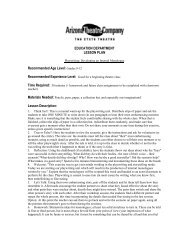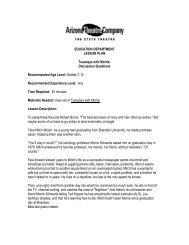Play Guide [1.2MB PDF] - Arizona Theatre Company
Play Guide [1.2MB PDF] - Arizona Theatre Company
Play Guide [1.2MB PDF] - Arizona Theatre Company
You also want an ePaper? Increase the reach of your titles
YUMPU automatically turns print PDFs into web optimized ePapers that Google loves.
WILLIAMS<br />
were still people in New Orleans who were judgmental<br />
about people of different sexual orientations than<br />
themselves, Tom found himself, for the fi rst time in his life,<br />
fully embracing a gay lifestyle, an option that had been all<br />
but impossible in his previous living situations. In New<br />
Orleans, Tom became routinely known as “Tennessee,”<br />
named for the state of his father’s birth.<br />
"Why did I write? Because I found life unsatisfactory."<br />
– Tennessee Williams<br />
In 1940, Tennessee’s fi rst full-length play to be produced, Battle<br />
of Angels, failed miserably. It was not until 1944 when The<br />
Glass Menagerie opened in Chicago and went on to have a<br />
very successful run on Broadway that Williams had his fi rst taste<br />
of success. With The Glass Menagerie, Tennessee revisited his<br />
complex relationship with his mother and sister and his feelings<br />
about his family life. The journey of Tom, the character from The<br />
A fi rst edition copy of<br />
The Glass Menagerie<br />
The Glass Menagerie<br />
Actor Noel Joseph Allain who<br />
plays Tom in ATC’s production of<br />
The Glass Menagerie<br />
Glass Menagerie, mirrors much of Tennessee’s own life, although he took certain theatrical<br />
liberties. Following the attention he received from The Glass Menagerie, Tennessee now<br />
had to create a new play to compete with his new commercial and critical success. He<br />
found this work in a play originally entitled The Poker Night, which would eventually<br />
become A Streetcar Named Desire. When A Streetcar Named Desire opened in 1947, it<br />
became an instant success; Williams won a Pulitzer Prize for it in 1948.<br />
At the same time as Williams was experiencing professional<br />
success, he also met and fell in love with a man named Frank<br />
Merlo. During the years he spent with Merlo, Williams was<br />
very productive professionally, creating three of his most<br />
famous plays: The Rose Tattoo, Cat on a Hot Tin Roof, and<br />
The Night of the Iguana. Williams was awarded his second<br />
Pulitzer Prize in 1955 for Cat on a Hot Tin Roof. However,<br />
when Merlo died in 1961 of lung cancer, Williams entered<br />
a ten year period of self-destruction and depression. He<br />
became addicted to alcohol and prescription drugs and<br />
suffered from an overwhelming fear that he would go insane.<br />
His work suffered greatly and most people agree that his later<br />
work lacks the spirit and quality of his earlier plays.<br />
Death is one moment, and life is so many of them.<br />
–Tennessee Williams<br />
Williams choked to death on a bottle top from one of his prescription bottles on February<br />
24, 1983 in New York City. Despite the fact that he considered New Orleans his<br />
spiritual home, his family insisted on burying him in St. Louis, Missouri, the city in which<br />
The Glass Menagerie takes place (and a city he despised). The body of work Williams<br />
left behind is impressive; it includes twenty-fi ve full length plays, two novels, a novella,<br />
<strong>Arizona</strong> <strong>Theatre</strong> <strong>Company</strong> <strong>Play</strong> <strong>Guide</strong> 7


![Play Guide [1.2MB PDF] - Arizona Theatre Company](https://img.yumpu.com/11952176/7/500x640/play-guide-12mb-pdf-arizona-theatre-company.jpg)


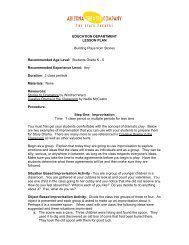

![Play Guide [356k PDF] - Arizona Theatre Company](https://img.yumpu.com/46218320/1/190x245/play-guide-356k-pdf-arizona-theatre-company.jpg?quality=85)
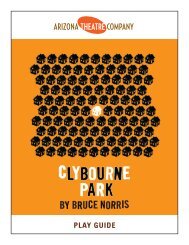
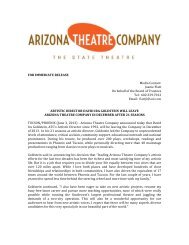



![[title of show] Arizona Theatre Company Play Guide 1](https://img.yumpu.com/24482689/1/190x245/title-of-show-arizona-theatre-company-play-guide-1.jpg?quality=85)
